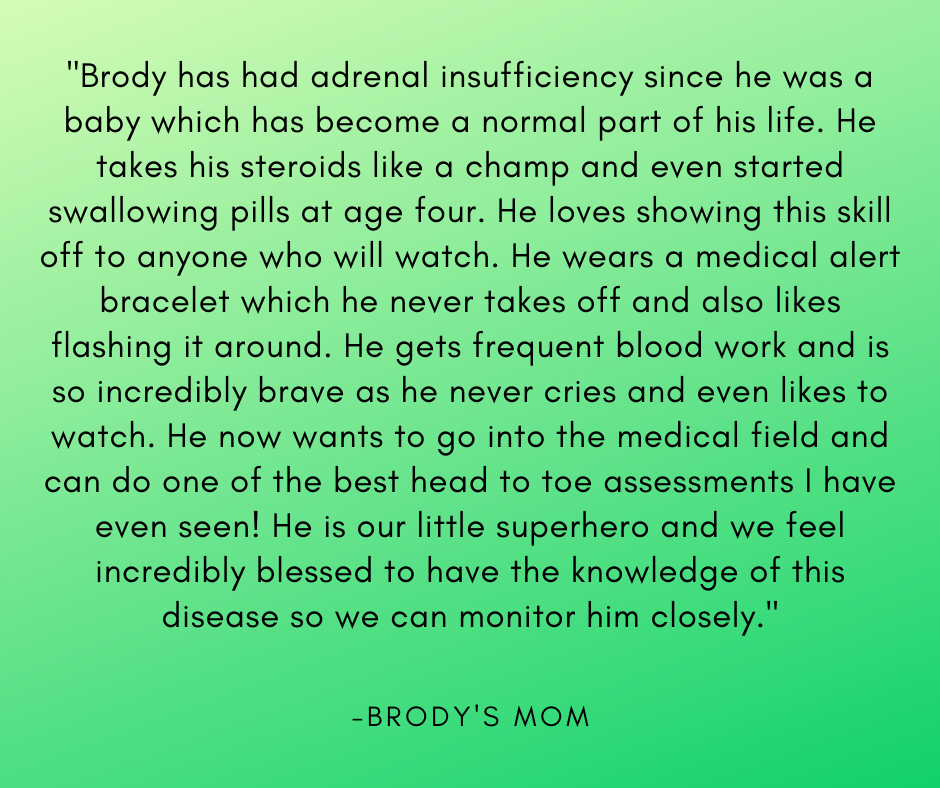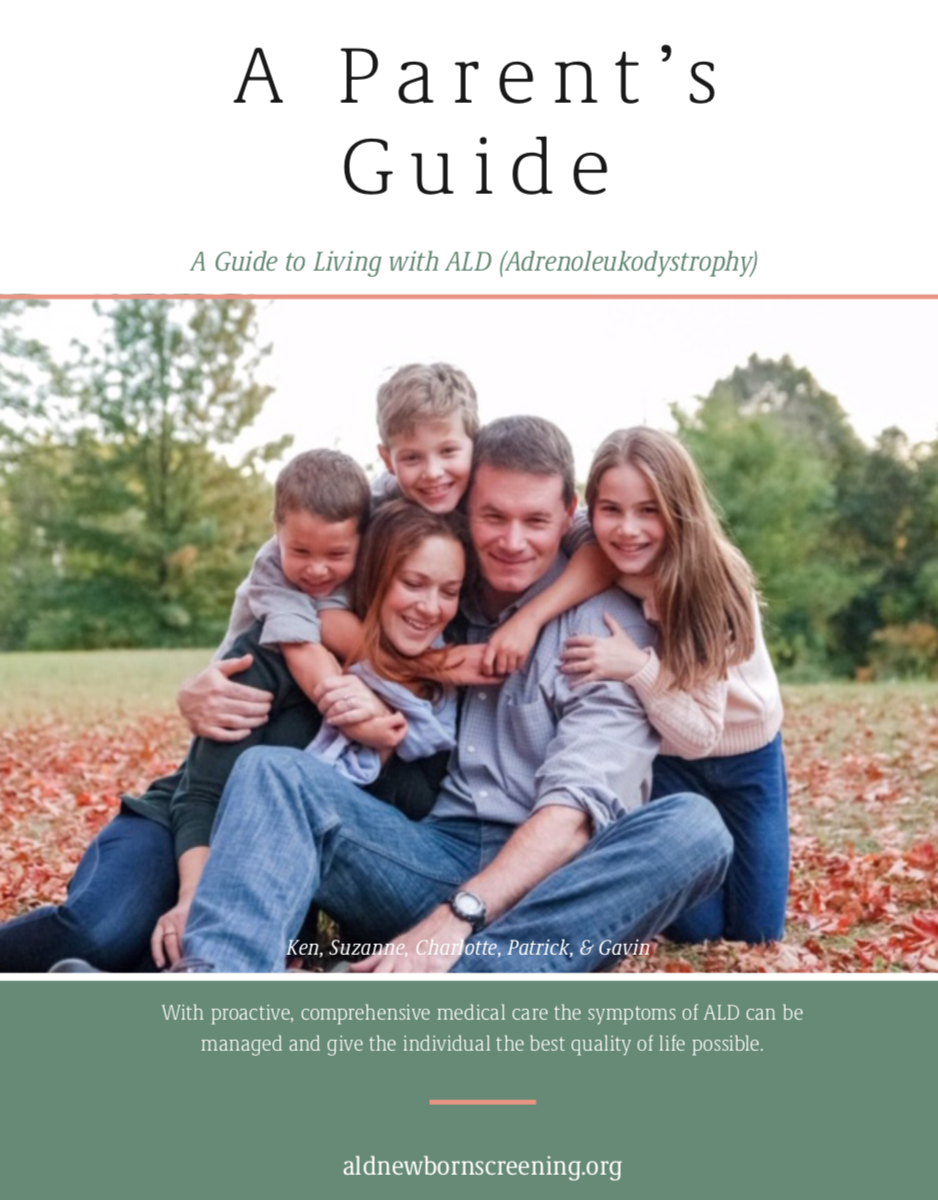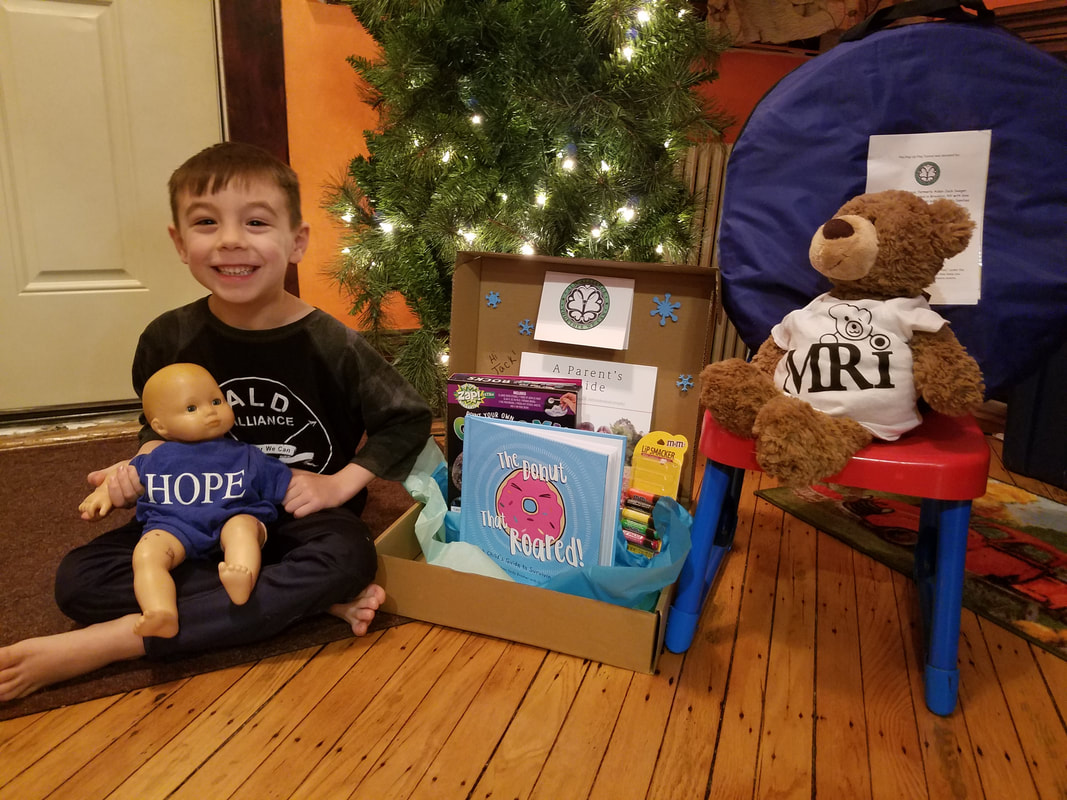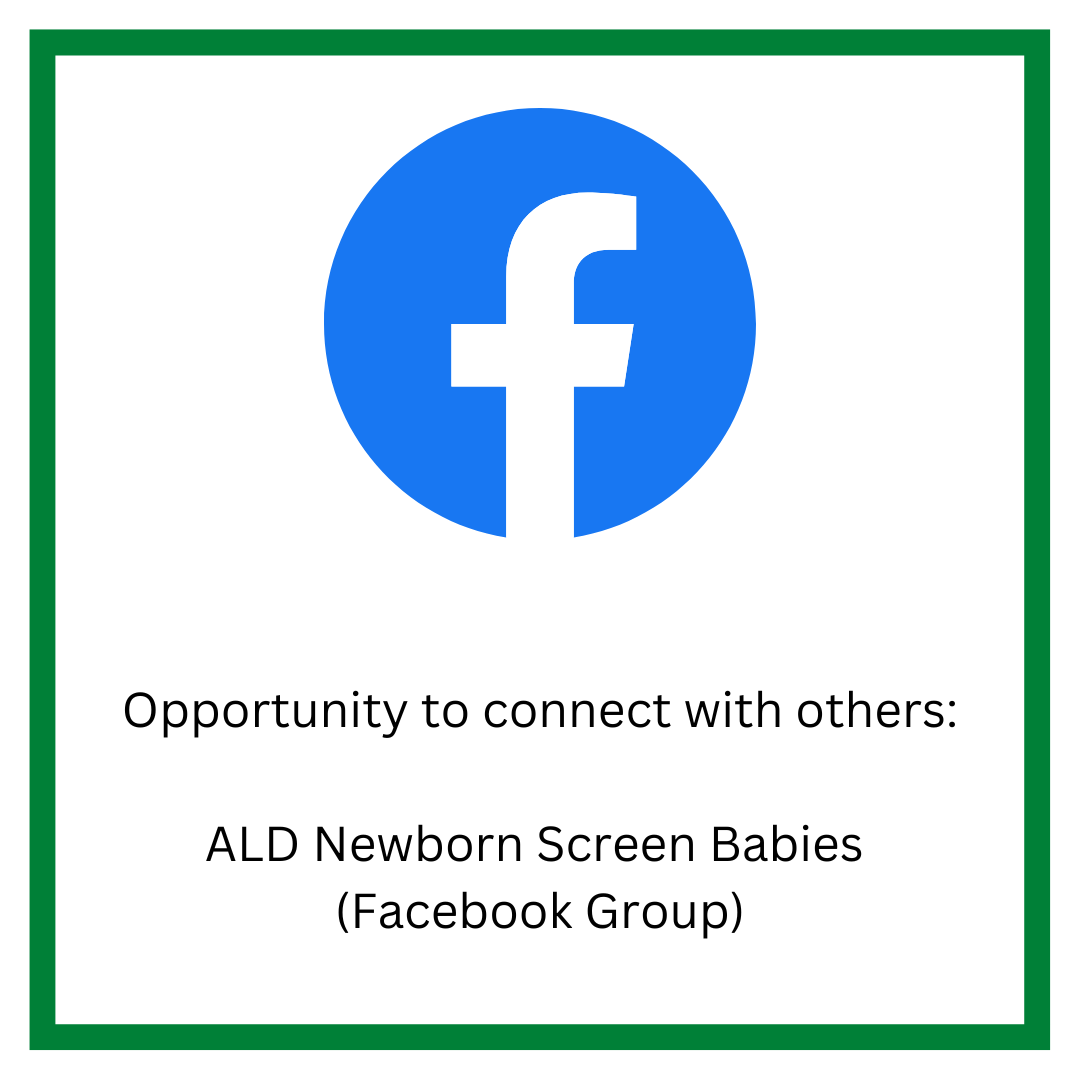|
Brave Brody shows us how easy it is
taking his medicine for adrenal insufficiency! Monitoring protocols for boys with ALD can be found in our Parent's Guide to ALD (click above).
Register here for a free care package for baby boys
diagnosed with ALD through newborn screening. |
Diagnosis at Birth Receiving a newborn screening diagnosis of ALD is an incredibly stressful experience for which no parent can ever be fully prepared. The birth of a child is meant to be a happy time of celebration and looking forward to milestones and memories. The future may now seem uncertain and scary, but learning of this diagnosis at birth allows for the lifesaving monitoring and intervention that exists for ALD. When you know about ALD from the first days of life, it puts you and your child one step ahead of this disease. If you are a parent who was also identified to have ALD because of your child’s newborn screening, you may be wondering how this may impact your own health, the health of other relatives, and your future family planning. You may be experiencing feelings of guilt for inadvertently passing ALD on to your baby. If your baby is a “de novo” case (no family history), you may be questioning why this happened out of nowhere. These are normal feelings associated with receiving this diagnosis. At some point, you will likely make peace with this new reality and not put so much emphasis on the how and why. However, this may take time, and if at any point you are feeling overwhelmed, especially if you and/or your spouse/parenting partner are struggling to care for yourself or your family, it is important to acknowledge the possibility of depression, anxiety, or a trauma response. Any caregiver can be impacted by these feelings. If you think you are experiencing symptoms, don't wait to see if things improve. Talk to your doctor about treatment options, which may include therapy and/or medication. Remind yourself it is okay to ask for help when needed. Because ALD is a genetic disease, the diagnosis of a newborn can cause a stressful “ripple effect” throughout a family. Other family members may likely be diagnosed because of your child’s newborn screening test results. Genetic counselors can help with the testing of additional family members. They can also help explain what ALD is and how it is inherited, and help connect parents and caregivers with additional medical care and psychosocial support. You may feel isolated from friends and family members. However, research shows that social support is very important for family coping. Build an emotional support system that best suits you and your family’s needs. Some parents turn to social media to share their story and communicate with loved ones. Others may choose to limit the knowledge of this diagnosis to only those family members who consequently need to be tested. Discuss with your spouse or parenting partner what makes sense for your family moving forward. It is beneficial to be on the same page when it comes to how and who to communicate this newfound information to and it is important to check in with each other periodically. You and your partner may be at different levels of acceptance and may cope differently but you can still find ways to support one another. If you are both struggling with this or find yourselves at different levels of acceptance with this diagnosis, consider speaking to a counselor or therapist together. It might make sense to include siblings in these conversations depending on their age. If you have a male baby in your family who was diagnosed with ALD, you may find the next section on monitoring protocols to be helpful. If you have a female baby in your family who was diagnosed with ALD and you are looking for emotional support with regards to family planning, we encourage these families to reach out to Remember The Girls. Part of their mission is to provide support to families pursuing assisted reproductive technologies and adoption. The Stress of Monitoring Protocols The current standards of care for monitoring male children with ALD can be found here. If the metabolic center you were directed to after your child’s diagnosis was not able to assist you in building your team of doctors, a list of ALD experts is available. Coordinating appointments can be overwhelming in the beginning but after a few visits you will find a rhythm that works for your family and your hospital or medical center. If your child was diagnosed due to a sibling’s birth or because of another family member’s diagnosis, you may find your child being thrust into this monitoring protocol without a lot of time for you to adjust. Your care team may signal urgency for some of the testing. A doctor’s haste to have tests expedited are with your child’s best interest in mind. For males with ALD, blood draws are a necessity to determine adrenal insufficiency status. We like Dr. Greene’s parenting tips for helping children who express fear of having blood work done. Your child’s first brain MRI is an important milestone in his monitoring journey. By following the recommended MRI schedule, you can ensure that if your child develops cerebral ALD, it will be identified at an early stage when treatment can be the most effective. MRI Day can be quite stressful, but there are resources available to help you. You can read one ALD parent’s synopsis of what the day will look. Be sure to take advantage of your center’s child life specialists (health care professionals who help children and families navigate the process of illness and hospitalization) if that is available to you. You can also watch ALD Connect’s MRI preparedness webinar for tips to make the day run as smoothly as possible. Typically after the first two MRIs, your child will be having brain scans every 6 months. Many families at this point express feeling like they are living in “6 month cycles,” experiencing joy after the news of an MRI that does not indicate findings of cerebral ALD, and then feelings of anxiety grow stronger as the date of the next MRI approaches. Discussing the Diagnosis with your Children As they grow up, children are likely to ask questions about ALD and the monitoring protocol. Some may have questions and feelings about their health and reproductive future as they age. You know your child best and can determine what level of information is appropriate to share at the right time. Generally speaking, it is best to answer questions directly and encourage children to express their feelings and concerns to you so that the lines of communication are always open. It is not necessary to give more information than what they are asking for. Also remember that children are always listening. Be careful what you say around them, especially if you may not be ready to have a full discussion about what you may be chatting about with another adult. It is OK to respond with “I don’t know” if your child asks a question with no concrete answer. Be honest and do not make promises you cannot keep. We do not know what the future holds for any one of us, but we can validate feelings and say that family members will do everything possible to be there for each other. You may anticipate medical appointments as they come up and help prepare your child for any emotions and anxiety that come to the surface. Many of us want to be brave for our children, but we should not be afraid to show and discuss our emotions with them. Siblings that are not affected by the disease may also be dealing with a wide range of emotions; from guilt for not having ALD to concern for their brother’s health. Meet them where they are at mentally and emotionally and discuss as much as possible together as a family. Giving siblings a role to play or age-appropriate tasks to help out with during your ALD journey could help them feel empowered and included. Siblings can also benefit from one-on-one time with caregivers when this opportunity is available. Peer support groups such as Sibshops include activities, games, and discussions about common experiences, joys, and concerns in a group setting with other children and teens who have a brother or sister with a disability or chronic health condition. In keeping an open dialogue with your child, there will likely never have to be “one big” speech that discloses the ALD diagnosis. Think of it as an ongoing string of tiny conversations that are important to have and will ultimately lead to a young adult who is equipped to cope with this diagnosis and handle their monitoring routine and healthcare needs. Despite the foundation you build, there may be times when your child does not feel comfortable going to you to talk. Let them know who else in their life they can trust and share their feelings with. Some children may also benefit from working with a pediatric psychologist to learn skills for coping with their ALD diagnosis. Resources to find a therapist near you: Psychology Today Good Therapy BetterHelp |
Coping with a Newborn Screening Diagnosis
© ALD Alliance 2024
The ALD Alliance is a non-profit 501(c)3 organization.
We are a charity run by volunteers with every donation directly benefiting our mission.
The ALD Alliance is a non-profit 501(c)3 organization.
We are a charity run by volunteers with every donation directly benefiting our mission.





